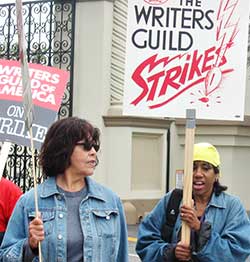Screenwriters take on media conglomerates
By
Page Getz
Los Angeles
Published Nov 7, 2007 11:29 PM
For the first time in 20 years, screenwriters on both coasts went on strike on Nov. 5. Television and film studios across Los Angeles County felt the
heat when the rank and file didn’t show up to work.
|
Picket at Paramount Studios
in Hollywood.
WW photos Maggie Vascassenno
|
Universal Studios was one of 14 local production lots surrounded by picket
lines when some 12,000 members of the Writers Guild of America hit the
sidewalks.
After 11 hours at the bargaining table, the studios had called off negotiations
late on Sunday night when New York writers walked off their sets and onto
picket lines at midnight Eastern time.
Every gate of CBS was mobbed with picketing writers, who were joined by Screen
Actors Guild (SAG) members. Teamsters dropped off donuts to support the union
and several shows shut down production, walking off their sets in a show of
solidarity.
Now a writer, Cy Kennedy was a production assistant on the other side of the
picket line during the last writers’ strike in 1988.
“A lot of people don’t realize the history of this lot, but
there’s a gate up there that no one uses that was for the other strike
and they put that gate up just to get around the union,” he told this
reporter. “They were gonna go non-union and they were so scared, they
broke in a new gate. I just remember being on the other side and I thought, if
this happens again, I’ll make sure I’m on the right side picketing
instead of sneaking around the back gate.”
That 22-week strike cost the industry upwards of $500 million. Guild officials
say they expect this strike will cost the studios more than $1 billion.
According to the Guild, rampant acquisitions and mergers in the 1990s put
nearly 80 percent of the entire television and film industry in the hands of
only five companies—GE, Disney, Viacom, News Corp and Time Warner. As a
result of the consolidation, the bargaining power of writers has been radically
diminished.
Entertainment is the third-largest employer in Los Angeles County, generating
some $30 billion in annual revenue.
While the studios claim the strike will devastate the local economy, Pamm Fair,
deputy national executive director of SAG, says outsourcing is a much greater
threat to the industry.
“There’s a lot of talk about the economic impact that a strike will
have down the road, but we make a lot of arguments about the economic impact of
runaway production and the same media outlets don’t cover that. I find it
very ironic that when there’s a labor dispute it’s all about this
economic force, but when we talk about runaway production there’s sort of
a ho hum feeling.”
The union voted to strike after negotiations came to an impasse in October over
compensation for new media. The studios run entire shows on the Internet,
calling it promotional, but this activity generates massive ad revenues.
Actress Justine Bateman says that both writers and actors have been shut out of
this money. “If you show the entire episode and there’s pop-ups and
banner ads, that’s no longer a promotion, you are peddling your wares.
And the wares happen to be things we are involved with making and that’s
not the structure of this business. So, no, you can’t show our stuff on
another venue for free; what we do for a living is not volunteer work,
it’s how we make a living.”
The entertainment industry employs 254,000 residents in Los Angeles County. The
Alliance of Motion Picture & TV Producers warns a strike will shut down the
city, but it’s a sacrifice Whitaker says the writers and actors are
willing to pay for justice.
Articles copyright 1995-2012 Workers World.
Verbatim copying and distribution of this entire article is permitted in any medium without royalty provided this notice is preserved.
Workers World, 55 W. 17 St., NY, NY 10011
Email:
[email protected]
Subscribe
[email protected]
Support independent news
DONATE


